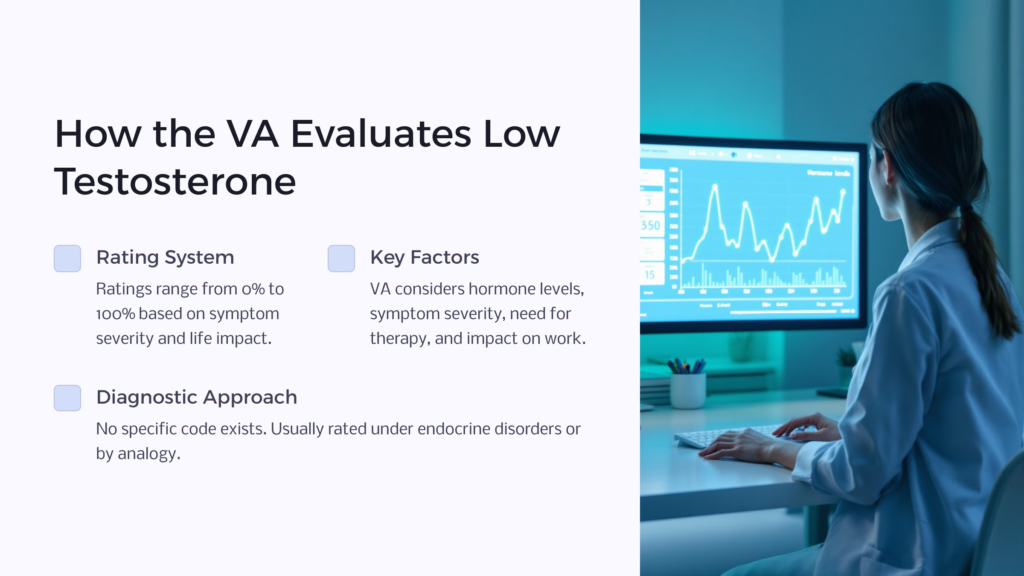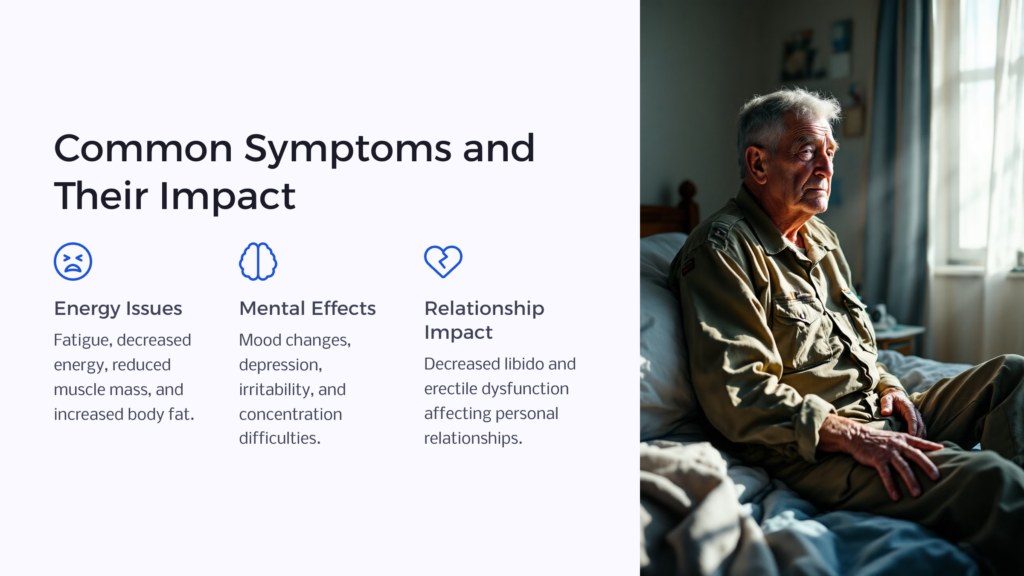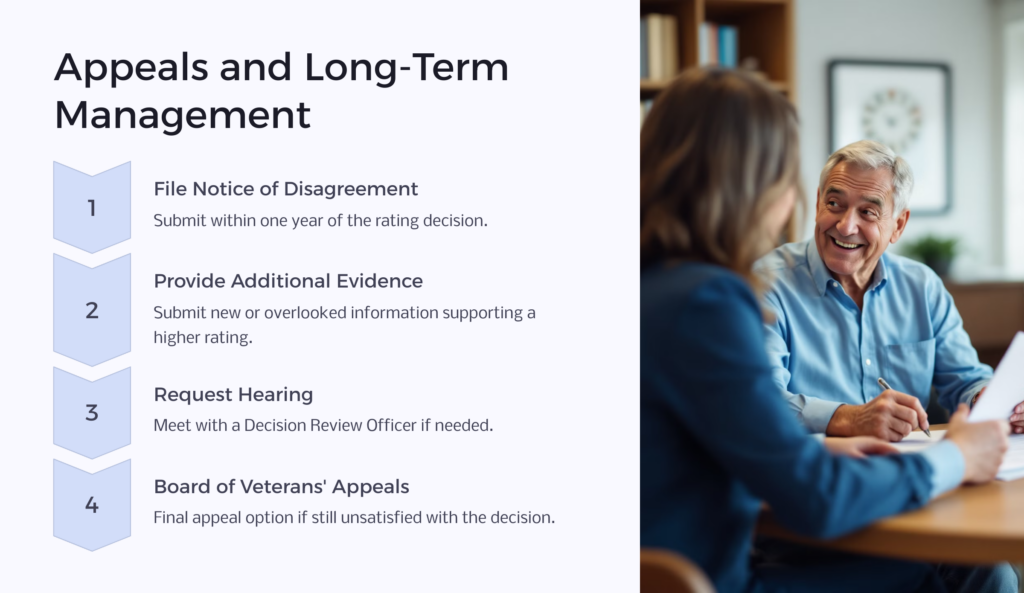Low testosterone, also known as hypogonadism, is a condition that affects many veterans. The Department of Veterans Affairs (VA) recognizes this issue and provides disability ratings for those affected. These ratings are important because they determine the level of compensation and benefits a veteran may receive for their service-connected condition.
Veterans with low testosterone often experience symptoms like fatigue, decreased libido, and mood changes. These symptoms can significantly impact their quality of life and ability to work. The VA rating system aims to address these challenges by providing appropriate support and compensation.
It’s crucial for veterans to understand how the VA evaluates and rates low testosterone. This knowledge can help them navigate the claims process more effectively and ensure they receive the benefits they deserve.
How the VA Rates Low Testosterone

The VA uses a specific system to rate low testosterone in veterans. This system is based on the severity of symptoms and the impact on daily life. The ratings typically range from 0% to 100%, with higher percentages indicating more severe cases.
For low testosterone, the VA often considers factors such as:
- Hormone production levels in blood tests
- Frequency and severity of symptoms
- Need for ongoing hormone replacement therapy
- Impact on work and daily activities
It’s important to note that the VA doesn’t have a specific diagnostic code for low testosterone. Instead, it’s usually rated under endocrine system disorders or by analogy to other conditions with similar symptoms.
Veterans should provide comprehensive medical evidence, including blood test results and detailed symptom descriptions, to support their claim for a fair rating.
Common Symptoms and Their Impact on VA Ratings

Low testosterone can cause a wide range of symptoms, each of which can influence the VA rating. Some of the most common symptoms include:
- Fatigue and decreased energy levels
- Reduced muscle mass and strength
- Increased body fat
- Decreased libido and erectile dysfunction
- Mood changes, including depression and irritability
- Difficulty concentrating and memory issues
The VA considers how these symptoms affect a veteran’s daily life and ability to work. For example, severe fatigue that limits job performance or erectile dysfunction that impacts relationships may lead to higher ratings.
Veterans should document all symptoms thoroughly and explain how they interfere with daily activities. This information helps VA raters understand the full impact of low testosterone on the veteran’s life.
Obtaining a VA Disability Rating for Low Testosterone
To receive a VA disability rating for low testosterone, veterans must follow a specific process:
- File a claim with the VA, either online or through a Veterans Service Organization.
- Provide medical evidence of low testosterone diagnosis and symptoms.
- Attend a Compensation and Pension (C&P) exam if requested by the VA.
- Wait for the VA to review the claim and assign a rating.
It’s crucial to submit a well-documented claim. This should include medical records, lab results showing low testosterone levels, and statements from the veteran and others describing the impact of symptoms on daily life.
Veterans can also seek help from Veterans Service Organizations or accredited representatives to navigate the claims process more effectively.
Importance of Medical Evidence in Low Testosterone Claims
Strong medical evidence is vital for a successful low testosterone VA claim. This evidence should include:
- Blood test results showing low testosterone levels
- Doctor’s notes detailing symptoms and treatment
- Records of hormone replacement therapy, if applicable
- Statements from the veteran describing symptoms and their impact
The more comprehensive and detailed the medical evidence, the better chance a veteran has of receiving an appropriate rating. It’s important to work closely with healthcare providers to ensure all necessary tests and documentation are completed.
Veterans should also consider keeping a symptom journal to track the frequency and severity of their symptoms over time. This can provide valuable information for both medical providers and VA raters.
Challenges in Getting a Fair VA Rating for Low Testosterone
Obtaining a fair VA rating for low testosterone can be challenging for several reasons:
- Lack of specific diagnostic code: Since there’s no specific code for low testosterone, it may be rated by analogy, which can lead to inconsistencies.
- Varying symptom severity: Symptoms of low testosterone can fluctuate, making it difficult to assess their overall impact.
- Misunderstanding of the condition: Some VA raters may not fully understand the wide-ranging effects of a low testosterone level.
- Comorbid conditions: Low testosterone often occurs alongside other health issues, which can complicate the rating process.
To overcome these challenges, veterans should provide as much detailed information as possible about their condition and its effects. Seeking assistance from experienced Veterans Service Officers or attorneys can also be helpful in navigating these complexities.
Treatment Options and Their Effect on VA Ratings
Treatment for low testosterone, particularly hormone replacement therapy, can significantly improve a veteran’s quality of life. However, it’s important to understand how treatment might affect VA ratings:
- Successful treatment may lead to symptom improvement, potentially resulting in a lower rating.
- Ongoing need for treatment, especially if symptoms persist, may support maintaining or increasing the rating.
- Side effects from treatment could potentially be considered for additional ratings.
Veterans should discuss treatment options thoroughly with their healthcare providers. It’s important to weigh the benefits of treatment against potential impacts on VA ratings. Remember, the primary goal should always be improved health and quality of life.
Appealing a Low Testosterone VA Rating Decision

If a veteran disagrees with their VA rating for low testosterone, they have the right to appeal. The appeals process includes several steps:
- File a Notice of Disagreement within one year of the rating decision.
- Submit additional evidence to support the claim for a higher rating.
- Request a hearing with a Decision Review Officer if desired.
- If still unsatisfied, appeal to the Board of Veterans’ Appeals.
During the appeal process, it’s crucial to provide any new or overlooked evidence that supports a higher rating. This might include new medical records, additional doctor’s statements, or more detailed descriptions of how symptoms affect daily life.
Veterans should consider seeking assistance from Veterans Service Organizations or legal representatives experienced in VA appeals. These professionals can provide valuable guidance throughout the appeals process.
Long-Term Considerations for Low Testosterone VA Ratings
Veterans with low testosterone should be aware of long-term considerations regarding their VA ratings:
- Ratings may be reevaluated periodically, especially if the condition is expected to improve.
- Changes in symptoms or treatment needs should be reported to the VA to ensure the rating remains accurate.
- Secondary conditions caused by low testosterone may be eligible for additional ratings.
It’s important for veterans to maintain regular medical care and keep the VA informed of any changes in their condition. This helps ensure that the rating continues to reflect the true impact of low testosterone on the veteran’s life.
Veterans should also be aware of other VA benefits they may be eligible for, such as vocational rehabilitation or healthcare services, which can provide additional support for managing low testosterone and its effects.
Let us help you at Allveteran.com. Start today by finding your rating with our free medical evidence screening!
 AllVeteran.com Advisors
AllVeteran.com Advisors
With expertise spanning local, state, and federal benefit programs, our team is dedicated to guiding individuals towards the perfect program tailored to their unique circumstances.


















